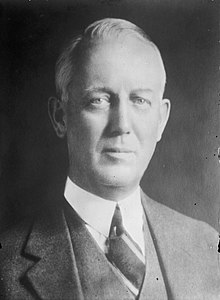Frank L. Smith
| Frank L. Smith | |
|---|---|
 |
|
| Member of the U.S. House of Representatives from Illinois's 17th district |
|
|
In office March 4, 1919 – March 3, 1921 |
|
| Preceded by | John Allen Sterling |
| Succeeded by | Frank H. Funk |
| Personal details | |
| Born |
November 24, 1867 Dwight, Illinois, U.S. |
| Died | August 30, 1950 (aged 82) Dwight, Illinois, U.S. |
| Political party | Republican |
Frank Leslie Smith (November 24, 1867 – August 20, 1950) was an Illinois politician. Smith was born in Dwight, Illinois, in Livingston County He served as a United States Congressman from 1919 to 1921. He was elected by the people of Illinois to the United States Senate in 1926, but the Senate never allowed him to take his seat.
He first ran for the Republican nomination for the U.S. Senate in 1920. In that first year of suffrage, women's votes were counted separately from men's. He was beating William B. McKinley by 27,000 votes after the male votes were counted, but once the female votes were counted McKinley had won by 11,000 votes. McKinley went on to win the general election.
In 1921, Smith became the chairman of the Illinois Commerce Commission, which oversaw utilities in the state. He prepared to run again for the Senate in 1926. At the time, Illinois had no campaign finance laws. Smith collected donations from several wealthy executives who ran public utilities, including $125,000 from Samuel Insull. He used this money to defeat McKinley in the Republican primary held in the summer of 1926. Smith went on to win the general election held in November of that year, although Julius Rosenwald offered him $550,000 of Sears, Roebuck & Company stock to withdraw.
McKinley, whose lame duck term would normally extend until March 1927, died in December 1926. Illinois Governor Len Small (R) appointed Smith to fulfill the rest of McKinley's term, but when Smith went to Washington to present his credentials as the appointed Senator, the U.S. Senate voted to not allow him to qualify as a senator, based upon alleged fraud and corruption in his campaign. In a special election he tried to again qualify as the elected Senator in March 1927, but was again denied. He finally resigned his seat on February 9, 1928.
...
Wikipedia
